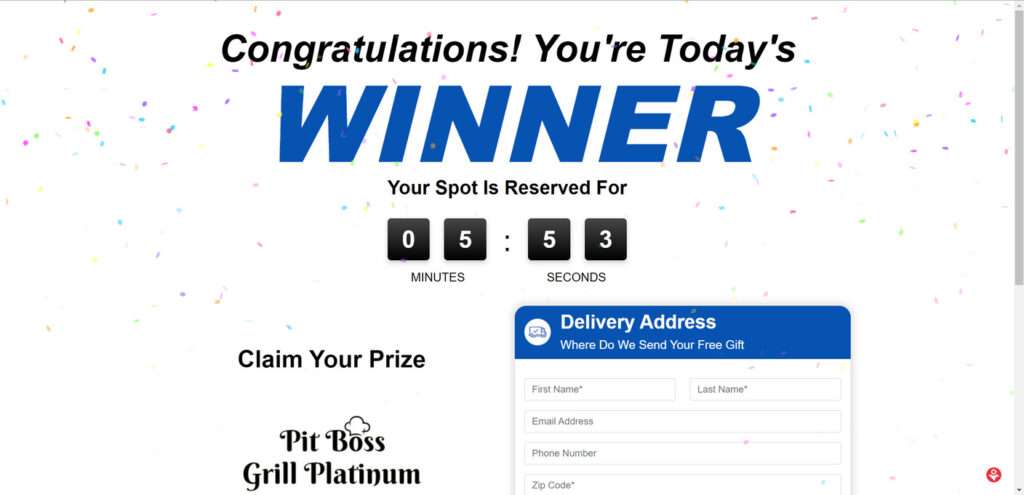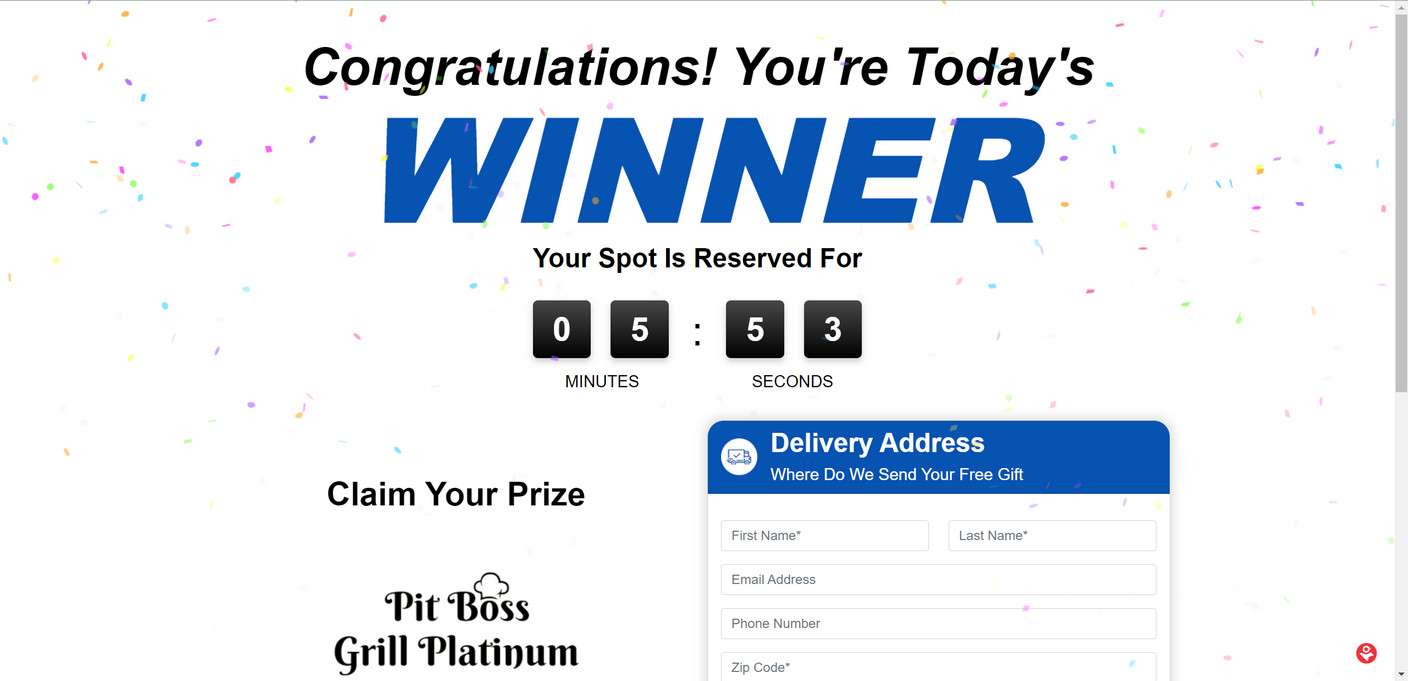Backyard barbecues with family and friends are a treasured summer tradition. And with pellet grills surging in popularity, it’s no wonder opportunistic scammers are eager to exploit consumer demand. Fraudulent emails and websites have emerged promoting free or heavily discounted Pit Boss grills, supposedly thanks to a Guy Fieri partnership. However, these offers are completely fake.
In this article, we’ll reveal how to spot this scam and avoid surrendering your personal information or money to grilling scammers determined to harsh your barbecue buzz.
- Overview of the Guy Fieri Pit Boss Pellet Grill Scam
- How the Guy Fieri Pit Boss Pellet Grill Scam Works
- What to Do If You Fell For the Pit Boss Grill Scam
- How to Spot the Telltale Signs of a Pit Boss Grill Scam
- How to Identify the Scam on Facebook
- Protect Yourself: Expert Tips to Avoid Pellet Grill Scams
- Frequently Asked Questions About the Pit Boss Grill Scam
- Don’t Let Scammers Harsh Your Grill Game

Overview of the Guy Fieri Pit Boss Pellet Grill Scam
This scam begins with an unsolicited email suddenly appearing in your inbox. The sender and subject line may vary, but the message generally explains that due to a special partnership between Pit Boss and celebrity chef Guy Fieri, you can receive a free or heavily discounted pellet grill.
Some versions of the email claim Pit Boss overestimated demand and now has excess inventory they need to get rid of. Others spin a story about packaging mistakes that forced Pit Boss to relabel and resell grills at huge discounts.
In all cases, the email insists this is a limited time offer reserved for a select group of recipients. You just need to click the link, provide some basic personal and payment information to cover a small shipping/handling fee, and the pellet grill will ship directly to your doorstep.
Unfortunately, this unbelievable deal is too good to be true. Guy Fieri has no promotional partnership with Pit Boss. The company is not giving away free pellet grills or selling them at massive discounts. Any email, website, or advertisement that says otherwise is a scam designed to steal your money and personal data.
These phony free grill offers typically ask for $40-$70 in shipping/handling fees. The scammers bank on the fact that such a low upfront cost is worth it to consumers if they really do receive a pellet grill worth hundreds of dollars. But rest assured, you will never see that imaginary grill.
The crooks behind this gimmick are focused on obtaining credit card details. Once you enter your information, they can rack up fraudulent charges or sell your details on the black market to other criminals. Even if you only lose the shipping fee you paid initially, this scam still helps fund criminal operations and leaves you vulnerable to further theft and fraud.
Breaking Down the Tactics
The Guy Fieri Pit Boss pellet grill scam succeeds by exploiting three powerful psychological motivations:
- The lure of free stuff – Who doesn’t love freebies? This scam banks on the feel-good notion of getting something valuable without paying for it. That emotional appeal overrides logical skepticism.
- FOMO (fear of missing out) – The emails emphasize that supplies are limited. This triggers the fear of missing out on an incredible deal that may never come your way again. Victims feel pressured to act fast before the imaginary grills are gone.
- Brand familiarity – Dropping Guy Fieri’s recognizable name elevates the perceived legitimacy of the scam. People are more likely to trust offers associated with a celebrity they admire versus unknown brands.
Combining these tactics allows the scammers to come across as believable despite the unrealistic nature of their supposed Grill giveaway. Understanding these manipulation methods is key to recognizing and avoiding the scam.
How the Guy Fieri Pit Boss Pellet Grill Scam Works
Scammers use a predictable playbook when executing the fake grill giveaway:
Step 1: Blast Out Emails
The scammers acquire or generate email lists and send out messages en masse. For each batch, they customize details like the sender name, subject line, domain, and message content. This makes the emails appear more targeted and less suspicious.
Email distribution platforms give scammers easy access to millions of addresses. They may purchase stolen email lists from the dark web, hack into websites to acquire customer data, or use special software to generate fake email accounts.
Step 2: Drive Traffic to the Phony Website
The emails all contain a clickable link directing victims to the fraudulent Guy Fieri Pit Boss website. This site looks convincing at first glance, featuring official branding images and buzzwords like “Flash Sale.”
But upon closer inspection, you may notice typos, grammatical errors, mismatched fonts, and other signs of a sloppy, hastily assembled scam site. The privacy policy, terms of service, and contact information are fake or nonexistent.
Step 3: Collect Personal and Payment Details
Once on the site, victims encounter an order form asking for personal information like name, address, and phone number. There are also fields for credit card details to cover the small shipping fee, often around $40-$70.
The scammers need this financial information to process payments and steal money. They also harvest personal data to enable additional identity theft or sell to other scammers.
Step 4: Complete the Transaction
Victims must input all requested details and click submit to finish the process. The website provides confirmation that the order is complete and the grill will ship soon.
In reality, no order exists and no products will ever ship. But the scammers now have what they really wanted all along – stolen money and personal data.
Step 5: Disappear and Move On
With credit cards charged and data collected, the scammers abandon the fake site and email accounts. They lay low before launching the same scam again with fresh details.
Meanwhile, victims wait in vain for their “free” grills to arrive. Any attempt to visit the site or contact the scammers again is futile. The crooks are long gone with the money.
What to Do If You Fell For the Pit Boss Grill Scam
If you already engaged with the phony Guy Fieri Pit Boss emails and website and surrendered personal or financial information, stay calm. Here are the necessary next steps to protect yourself:
Step 1: Contact Your Credit Card Company
Your top priority is limiting financial damage by halting any fraudulent charges. Call your credit card provider’s customer service line immediately. Report that you have been scammed and wish to dispute the charges. Ask them to reverse the transactions and issue a new card number to prevent additional charges.
Step 2: Change Account Passwords
Even if you only entered credit card info, there is a chance the scammers may try to access other accounts using passwords you’ve used elsewhere in the past. Reset the passwords on all your online accounts to be safe.
Step 3: Sign Up for Credit Monitoring
When scammers acquire your personal data, identity theft is a risk. Enroll in a credit monitoring service to catch any suspicious activity in your accounts. Many credit card companies offer this service for free to fraud victims.
Step 4: Notify the FTC
File a scam report with the Federal Trade Commission (FTC) at ReportFraud.ftc.gov. This helps authorities track and fight scams. Submit copies of any scam emails, order confirmations, credit card statements showing fraudulent charges, and other documentation.
Step 5: Warn Your Contacts
Let everyone in your contact list know about the scam. This helps prevent them from falling for the same trap if they receive one of the phony emails. Share details on social media too.
Step 6: Adjust Email Filtering Settings
Update your email account’s filtering rules to move new messages from unfamiliar senders directly to the spam/junk folder. Tighten email security settings and be more cautious about opening promotional or giveaway emails to avoid future scams.
By taking swift action and reporting the scam, you can limit the damage and prevent others from being victimized. Don’t blame yourself – scammers are masters of manipulation and their schemes fool even tech-savvy people. Use this as a learning experience to be more vigilant against email fraud tricks.
How to Spot the Telltale Signs of a Pit Boss Grill Scam
Now that you understand how the Guy Fieri Pit Boss grill giveaway scam unfolds, here are the most common red flags that can help you detect and avoid this scheme:
- The sender is unfamiliar – The email did not come from an account you recognize or have a previous relationship with. Reputable brands won’t cold contact you with free grill offers out of the blue.
- The deal seems too good to be true – Why would a popular brand give away luxury grills for free or at a massive, unrealistic discount? Any offer that seems too good to be true always is.
- Aggressive sales tactics – Phrases imploring you to “Act fast!” or “Hurry, limited quantities available!” are high-pressure sales tactics meant to overcome skepticism.
- Poor spelling/grammar – Emails riddled with typos or grammatical mistakes indicate scammers putting little effort into seeming authentic.
- Inconsistent branding – The emails or websites using unofficial logos, fonts, or design elements should raise suspicion.
- No customer service contact info – A real company would include a working customer service number, email, or chat portal to resolve order issues.
- Requests for unusual payment – At best, a legitimate company would only ask for standard payment like a credit card. But they’d never insist on sketchy methods like prepaid debit cards, wire transfers, cryptocurrency, etc.
When assessing promotions you aren’t 100% certain about, always do your due diligence first. A quick online search for reviews or complaints can reveal common scams. If an offer triggers any red flags, protect yourself by simply deleting the message.
How to Identify the Scam on Facebook
In addition to flooded inboxes, the Guy Fieri Pit Boss grill scam has also invaded Facebook. Scammers create fake profiles, pages, and groups to run the same phony giveaway gimmick and target Facebook users.
Here are the red flags to watch for:
- A Facebook friend sharing a post that seems out of character for them. The friend’s account may be hacked or cloned.
- Posts promoting the free grill appearing in various buy/sell groups you belong to. Scammers mass spam groups.
- A sponsored post or Facebook ad for the offer pops up in your feed. Scammers buy cheap Facebook ads to reach more victims.
- You receive a message about the grill deal that appears to come directly from a friend. Their account could be compromised.
- The post includes a suspicious external link rather than directing you to an official Facebook page. Scammers use third-party scam pages.
- Brand new Facebook profiles or groups you’ve never seen suddenly posting about the giveaway. These were created solely to run the scam.
- Comments and reactions on the posts seem fake, forced, or over-the-top excited. Scammers often fabricate engagement.
- Poor spelling/grammar, inconsistent branding, or other signs of sloppiness.
Always scrutinize viral free grill posts on Facebook to confirm it originates from Pit Boss’ real page before engaging. Search for the brand name + “scam” or “fake” to uncover warnings. Avoid clicking questionable links and never provide personal or financial information via Facebook to alleged grill giveaways.
Protect Yourself: Expert Tips to Avoid Pellet Grill Scams
While scam awareness helps, your best defense is exercising caution to avoid such traps in the first place. Here are pro tips for staying safe:
- Never trust unsolicited offers – Delete emails with deals that you didn’t specifically sign up to receive. Even if they appear personalized, assume they are scams.
- Verify legitimacy – Do research on the company and offer before providing any info. Check for a real website, customer support, and reviews backing up the claims.
- Avoid clicking links – Don’t click on links or attachments in unexpected emails. Type the URL directly into your browser if you want to investigate further. Links can download malware onto your device.
- Watch for spoofed emails – Scammers fake valid business names and logos in email addresses and messages. Always double check that emails are from official domains before engaging.
- Beware unusual payment demands – Don’t complete orders that require prepaid cards, wire transfers, cryptocurrency payments, etc. Stick to credit cards with strong fraud protections.
- Use secure passwords – Choose complex, unique passwords for each account. Enabling two-factor authentication adds an extra layer of security as well.
- Keep software updated – Maintain up-to-date operating systems, security software, and apps. Updates often include critical patches for vulnerabilities that scammers exploit.
The most foolproof way to gain peace of mind is purchasing grills directly from authorized retailers like Walmart, Amazon, or directly from the Pit Boss website. While everyone loves a good bargain, unbelievable deals and free offers that seem too good to be true should always set off warning bells. When in doubt, trust your instincts and steer clear.
Frequently Asked Questions About the Pit Boss Grill Scam
Still scratching your head and have questions about this brazen scam? Refer to this FAQ for quick answers to the most common concerns surrounding the fake Guy Fieri Pit Boss grill giveaway.
Why would scammers use Guy Fieri’s name?
Dropping Guy Fieri’s name adds perceived legitimacy and trustworthiness. People are more likely to think an offer is real if it’s associated with a well-known celebrity they admire versus an unknown entity.
How do the scammers obtain email lists for the phony offers?
They may hack websites and steal customer data, buy email lists on the black market dark web, use email scraping software to harvest addresses from websites, or use botnets to generate fake email accounts.
Can’t I just get my money back through a chargeback if it’s a scam?
Maybe, but don’t count on it. Scammers often use fraudulent credit cards or stolen payment info that gets declined. Even if you paid with your own card, they make it difficult and slow to claw back lost funds.
If I only lost the shipping fee, is it still worth reporting?
Absolutely! Even if you only paid a small upfront cost, reporting the scam helps authorities track these operations and limits their ability to defraud others.
Should I click unsubscribe or opt out of future emails?
No, any attempt to engage with the scammers gives away the fact that they reached a real, active email account. Ignore and delete the messages. Unsubscribing often leads to more spam.
How can I determine if an offer is associated with the real Pit Boss company?
Do research online for mention of the promotion on Pit Boss’ official website, social media, press releases etc. An authentic offer would be advertised openly, not just blasted randomly through emails.
Are the grills in the ads even real Pit Boss products?
Doubtful. Scammers simply grab images and the Pit Boss logo online. Don’t assume the grills pictured even exist. Everything about the offer is made up.
Is it safe to click on links or download attachments from the emails?
Absolutely not. The links and attachments are likely infected with malware designed to compromise your device and further steal your personal data. Delete everything.
I accidentally clicked the link – what should I do now?
First change your email password and any other account passwords you’ve used recently as a precaution. Also scan your device thoroughly with updated antivirus software to check for and remove any malware.
Can I unsubscribe or opt out from future scam emails?
It’s pointless. The scammers don’t honor unsubscribe requests, and clicking any links in the emails confirms you’re a real target. Just delete the messages automatically through filtering.
Stay vigilant and trust your instincts. If an offer triggers any suspicions, assume it’s a scam. Following our advice will help you avoid all sorts of phony free grill shenanigans and keep your personal information secure.
Don’t Let Scammers Harsh Your Grill Game
Backyard barbecuing should be a stress-free escape, not another source of fraud fears. With vigilance and healthy skepticism, you can keep scammers from crashing your cookout!
This comprehensive guide arms you with everything required to outsmart the Guy Fieri Pit Boss grill scam. Now you can sniff out the telltale tricks these grilling grifters employ and confidently delete their phony emails. Share the knowledge with your family and friends to help them avoid the burn too.
The irresistible aroma of smoky ribs and wood-fired flavor awaits. Don’t let scammers detour you from pellet grill mastery. Follow our tips to grill, chill, and enjoy your patio paradise all summer long without unwanted hassles interfering with your bliss!



